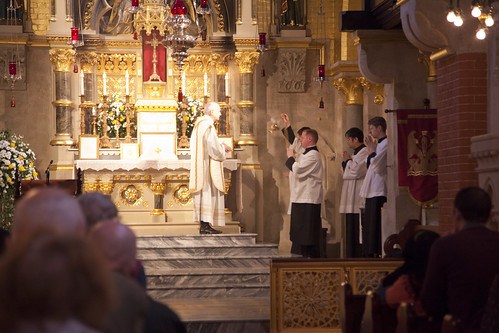 |
| Mass at Corpus Christi Maiden Lane |
The Tablet has published a letter from me in the ongoing discussion of the celebration of Mass 'ad orientem', facing the apse. It is remarkable how people have strong feeling about this (and many other things) and just assume that the Scriptures support them.
This time The Tablet has published my letter in full. (I always keep them short.)
--------------
Sir,
Peter Simmons informs us that at the Last Supper and at Calvary Jesus ‘faced those who were present and spoke to them in their own language.’ It would seem Mr Simmons’s imagination is more powerful than the facts.
The awkwardness of seeing and conversing with Christ as he was reclining at the head of the table at the Last Supper, with the Apostles arranged in a row on the same side as depicted in ancient mosaics, is reflected in the need for St Peter to pass a message to Him via the Beloved Disciple (John 13:22ff). Moreover He would certainly have addressed them at a Passover meal in the liturgical language, Hebrew, and not the day-to-day language, Aramaic, just as Jews do to this day.
On the cross Jesus’ use of Hebrew actually caused confusion and misunderstanding: hearing the Hebrew ‘Eli’, ‘Lord’, bystanders thought He meant ‘Elijah’ (Matt 27:46ff). He didn’t care, because He was addressing not them, but His Heavenly Father. As Mr Simmons says, this is a lesson for us.
Yours faithfully,
Joseph Shaw
Chairman of the Latin Mass Society
Sir,
Peter Simmons informs us that at the Last Supper and at Calvary Jesus ‘faced those who were present and spoke to them in their own language.’ It would seem Mr Simmons’s imagination is more powerful than the facts.
The awkwardness of seeing and conversing with Christ as he was reclining at the head of the table at the Last Supper, with the Apostles arranged in a row on the same side as depicted in ancient mosaics, is reflected in the need for St Peter to pass a message to Him via the Beloved Disciple (John 13:22ff). Moreover He would certainly have addressed them at a Passover meal in the liturgical language, Hebrew, and not the day-to-day language, Aramaic, just as Jews do to this day.
On the cross Jesus’ use of Hebrew actually caused confusion and misunderstanding: hearing the Hebrew ‘Eli’, ‘Lord’, bystanders thought He meant ‘Elijah’ (Matt 27:46ff). He didn’t care, because He was addressing not them, but His Heavenly Father. As Mr Simmons says, this is a lesson for us.
Yours faithfully,
Joseph Shaw
Chairman of the Latin Mass Society
Support the Latin Mass Society
No comments:
Post a Comment